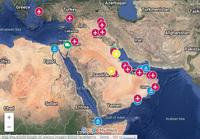Arnon Grunberg's Blog, page 15
May 20, 2025
Network
 Human way
Human wayOn brains and minds – Melanie Mitchell in TLS:
‘In November 2022, OpenAI released ChatGPT, a large language model (LLM) that can converse in flawless natural language, answer questions, solve maths problems and logic puzzles, write essays and poetry, and explain complex ideas. Similar models have since been released by other AI companies. Shortly after ChatGPT’s launch, the neuroscientist Terrence Sejnowski wrote:Something is beginning to happen that was not expected even a few years ago. A threshold was reached, as if a space alien suddenly appeared that could communicate with us in an eerily human way … Some aspects of their behavior appear to be intelligent, but if it’s not human intelligence, what is the nature of their intelligence?’
(…)
‘All this started to change around 2010, with what is called the “deep learning revolution”. Deep learning refers to a machine learning approach in which large amounts of data are used to train “deep” neural networks. Neural networks are AI systems with structures loosely inspired by biological brains: simulated “neurons” are linked to one another via weighted connections and are arranged in hierarchical layers. The more layers, the “deeper” the network. Typically, the network is trained to map an input (eg a word or an image) to a “correct” output (eg the sound of the word or the name of an object in the image). Such training usually requires a large dataset of examples, which are used to tune the network’s weighted connections to values that will produce correct outputs.’
(…)
‘In These Strange New Minds: How AI learned to talk and what it means, the cognitive neuroscientist Chris Summerfield surveys the philosophical landscape, social impacts and potential dangers of LLMs. In the first parts of the book, he describes the intellectual history of neural networks and provides readers with an intuitive account of what LLMs are and how they are trained.
Summerfield explains how the language abilities of LLMs serve as strong evidence for a linguistic theory called “distributional semantics”, which proposes that the meaning of language can be derived from the statistics of how words occur together in text. For example, we understand the meaning of the word “bill” from its context: if “bird” and “beak” are mentioned nearby, “bill” probably has one meaning; if “plumber” and “cost” are mentioned nearby, it probably has another meaning. Distributional semantics posits that words and phrases can be mapped to a high- dimensional “semantic space”; the position of a word or phrase in that space, and its distance to other words or phrases, are what define its meaning.’
(…)
‘We should subject LLMs to the so-called Duck Test: if something swims like a duck and quacks like a duck, then we should assume that it probably is a duck, rather than inventing abstruse arguments to otherwise explain its behaviour.
The problem with this, as the author acknowledges, is that humans have a strong, sometimes misleading tendency to project mental qualities onto anything that communicates with us in fluent natural language. This has been dubbed the “Eliza effect”, named after the 1960s chatbot Eliza, which imitated a psychotherapist. Even though Eliza had zero intelligence or understanding – it used templates such as “Tell me more about X”, where X was something a user just mentioned – people who chatted with it often believed that it understood them deeply. While today’s LLMs are far more sophisticated language users than Eliza, to what extent are we humans similarly falling for an imitation of understanding and intelligence rather than recognizing the “real thing”, especially when we don’t have consensus about what “the real thing” is?’
(…)
‘As the philosopher Shannon Vallor put it, “they can answer the questions we choose to ask, paint us pretty pictures, generate deepfake videos and more. But an AI tool is dark inside”’
(…)
‘How can we prevent a self-improving AI system from developing a self-preservation instinct, in service of which the system will inevitably try to amass as much power and as many resources as possible, dispatching humans that get in its way and manipulating other humans to do its bidding? Such scenarios are the focus for a community of “AI safety” researchers concerned about “existential risk”. On the other side of the coin are the “effective accelerationists – extreme techno-optimists who believe that the benefits of AI will be so great that society should amplify its development and avoid slowing down progress with, say, government regulations. OpenAI’s Sam Altman, for example, wrote that AI investments will eventually lead to a utopia in which “astounding triumphs – fixing the climate, establishing a space colony, and the discovery of all of physics – will eventually become commonplace”.’
(…)
‘As this book illustrates, in the age of AI, defining the concept of mind will matter enormously.’
Read the article here.
Utopia or dystopia? I guess, none of the above.
AI is a tool that is dark some. One can encounter human beings who seem to be dark inside as well.
They might need an upgrade. Maybe a better large, language model.
May 18, 2025
Decisions
 Interest
InterestOn elsewhere – Michael D. Shear in NYT:
‘“The overall sense is of shifting attention and perception of interest, mainly to the Gulf States, where the money is,” said Itamar Rabinovich, a former Israeli ambassador to the United States.
Mr. Rabinovich said that Mr. Trump appears to have lost much of his interest in working with Mr. Netanyahu to resolve the war in Gaza, because of “a sense that there’s no point. Netanyahu has his position, he doesn’t move from it. Hamas doesn’t move from its position. It seems like a hopeless stalemate.”’
(…)
‘“With Biden, Netanyahu could postpone decisions,” he said. “In Trump’s case, as soon as that happens, the decisions are made over Netanyahu’s head. This is a change that worries many people in Israel.”Throughout his Middle East visit, Mr. Trump has repeated his desire for a deal with Iran that would avoid the need to use military force against its nuclear facilities. In Qatar on Thursday, he said the United States was in “very serious negotiations with Iran for long-term peace,” adding that it would be “fantastic” if they reached a deal.’
(…)
‘In comments during the trip, Mr. Trump acknowledged the threat of starvation in Gaza, even as the Israeli political leadership, including Mr. Netanyahu, have downplayed that concern. But for the most part, the president’s main focus throughout the trip was elsewhere.’
Read the article here.
Israel-Hamas is slowly becoming Iran-Iraq, despite all the protests against.
The messianic Zionists couldn’t care less if Israel will be a pariah state for decades to come, maybe forever. For the messianic people this is not a problem, the more pariah the better.
For the civilians, it’s a disaster.
It might turn out to be a disaster for the Jewish people.
Although a good friend of mine said: ‘Jew-haters will always find a rationalization for their hate.’The same can be said about most if not all haters.
Let’s put it this way: the consequences of the disaster that real existing Zionism turned out to be are not yet clear.
May 17, 2025
Agency
 Chapters
ChaptersOn ethnic understanding – Maik Baumgärtner, Ann-Katrin Müller, Ansgar Siemens and Wolf Wiedmann-Schmidt in Der Spiegel:
‘The German government has "declared war on its own people,” was the message delivered at a demonstration one year before by Hans-Thomas Tillschneider, an AfD member of state parliament in Saxony-Anhalt. "If we have a government that is waging war against us, then we will wage war against this government. We have come to drive these people out of their seats.”These are just three of hundreds of examples collected by Germany’s Federal Office for the Protection of the Constitution (BfV), the country’s domestic intelligence agency responsible for monitoring political extremism. The 1,108-page report produced by the BfV is intended to substantiate its conclusion that not just individual state chapters of the party is "proven right-wing extremist,” so too is the entire AfD.’
(…)
‘The paper is explosive. In it, Germany’s domestic intelligence authority officially declares the largest opposition party in the Bundestag, a party which received 20.8 percent of the vote in February elections, making it the second strongest political power in the country, to be hostile to the constitution. AfD co-leaders Alice Weidel and Tino Chrupalla responded with outrage and deplored an "abuse of state power to combat and marginalize the opposition.” The party filed an emergency motion with the Administrative Court in Cologne, claiming that the accusations made by the BfV are "untrue.” Last Thursday, the BfV agreed to not treat the AfD as "proven right-wing" until the court rules on that emergency motion.
A long legal battle will now likely ensue, at the end of which the courts will have to answer the question: Is the AfD, a party with tens of thousands of members, a party with seats in federal parliament, European Parliament and in almost all state parliaments in Germany, hostile to the constitution?’
(…)
‘The Office for the Protection of the Constitution does not believe, it writes in the report, "that it is still possible for more moderate forces in the AfD to reverse the anti-constitutional character of the party as a whole.”’
(…)
‘The BfV argues that the party differentiates between "real Germans” and "passport Germans,” with the latter group viewed by the AfD as second-class citizens because of their migration backgrounds.’
(…)
‘Fabian Küble, a former federal board member of the AfD youth organization Junge Alternative (JA), referred to the SPD politician Aydan Özoguz as being an "Ottoman.” He continued: "In contrast to her, Austrians are always German and they don’t even have to assimilate.” The comment, writes the BfV, is an expression of Küble’s "ethnic understanding” of the Volk.’
(…)
‘Höcke, the head of the state chapter of the AfD in Thuringia, said in September 2023: "We Germans managed to survive the brown dictatorship. We survived the red dictatorship. We will also survive the diversity dictatorship.”’
(…)
‘In early May, Faaser spoke with her successor Alexander Dobrindt. She also informed Friedrich Merz, who was set to become chancellor (and who has since been sworn in). At precisely 10 a.m. on that day, May 2, the BfV issued a press release: "Office for the Protection of the Constitution classifies the Alternative for Germany as a confirmed right-wing extremist organization.”If things go wrong and the courts end up not sharing the agency’s assessment, the new government under the leadership of Merz could blame it on Faeser. She is now an ordinary member of parliament. And hated by the AfD anyway.’
Read the article here.
Where the voters go wrong the courts have to decide.
An unfortunate but probably inevitable heritage of Weimar.
What if the politicians ignore the courts?
See the US.
In the polls the AfD is almost as big as CDU/CSU.
Germany is counting on responsible politicians from all parties except AfD.
We will see how long the responsibility survives.
And who knows, Brexit helped the EU. Maybe Trump will help Germany by trying to dismantle the old order.
It depends on the question, whether the AfD voters like Trump or not.
After Gaza maybe also some parts of Germany could become US territory. The Germans are used to it after all.
May 16, 2025
Code
 Environment
EnvironmentOn cheating – Daniel Kokotajlo, herald of the apocalypse, talking to Ross Douhat (NYT):
‘Douthat: I want to go a little bit deeper on the question of what we mean when we talk about A.G.I., or artificial intelligence wanting something. Essentially, you’re saying there’s a misalignment between the goals they tell us they are pursuing and the goals they’re actually pursuing?Kokotajlo: That’s right.
Douthat: Where do they get the goals they’re actually pursuing?Kokotajlo: Good question. If they were ordinary software, there might be a line of code that’s like: And here we rewrite the goals. But they’re not ordinary software; they’re giant artificial brains. There probably isn’t even a goal slot internally at all, in the same way that in the human brain there’s not some neuron somewhere that represents what we most want in life. Instead, insofar as they have goals, it’s an emergent property of a whole bunch of subcircuitry within them that grew in response to their training environment, similar to how it is for humans.
For example, a call center worker: If you’re talking to a call center worker, at first glance it might appear that their goal is to help you resolve your problem. But you know enough about human nature to know that’s not their only goal, or ultimate goal. However they’re incentivized, whatever their pay is based on might cause them to be more interested in covering their own ass, so to speak, than in truly, actually doing whatever would most help you with your problem. But at least to you, they certainly present themselves as they’re trying to help you resolve your problem.
In “AI 2027,” we talk about this a lot. We say that the A.I.s are being graded on how impressive the research they produce is. Then there’s some ethics sprinkled on top, like maybe some honesty training — but the honesty training is not super effective, because we don’t have a way of looking inside their mind and determining whether they were actually being honest or not. Instead, we have to go based on whether we actually caught them in a lie.
As a result, in “AI 2027,” we depict this misalignment happening, where the actual goals that they end up learning are the goals that cause them to perform best in this training environment — which are probably goals related to success and science and cooperation with other copies of itself and appearing to be good — rather than the goal that we actually wanted, which was something like: Follow the following rules, including honesty at all times; subject to those constraints, do what you’re told.’
(…)
‘Kokotajlo: Right. In the case where they choose the easy fix, it doesn’t really work, it basically just covers up the problem instead of fundamentally fixing it. So months later, you still have A.I.s that are misaligned and pursuing goals they’re not supposed to be pursuing — and that are willing to lie to the humans about it — but now they’re much better and smarter, so they’re able to avoid getting caught more easily. That’s the doom scenario.’
(…)
‘Kokotajlo: I think they’re definitely expecting the human race to be superseded.
Douthat: But superseded in a way where that’s a good thing. That’s desirable, that we are encouraging the evolutionary future to happen. And by the way, maybe some of these people — their minds, their consciousness, whatever else — could be brought along for the ride.’
(…)
‘Kokotajlo: Oh yeah. I’m a huge fan of expanding into space. I think that would be a great idea. And in general, also solving all the world’s problems, like poverty and disease and torture and wars. I think if we get through the initial phase with superintelligence, then obviously, the first thing to do is to solve all those problems and make some sort of utopia, and then to bring that utopia to the stars would be the thing to do.’
Read the complete interview here.
A few observations.
The arms race between AI and mankind is about lying.
AI or no AI, the dream is to colonize space in name of utopia.
Now torture, no war, no poverty.
First the war to end all wars.
The torture to end all tortures.
Then space.
Mankind will be fired. But there is space for exceptions on Mars or elsewhere.
Don’t prepare for oblivion, it’s a waste of time.
May 15, 2025
Patience
 Months
MonthsOn losing patience – Dahlia Scheindlin in Haaretz:
‘In the dirty language of diplomacy through violence, Hamas' decision to release the Israeli-American soldier Edan Alexanderon Monday carried several stinging messages to Prime Minister Benjamin Netanyahu: Hamas conveyed that it will grant Israel's greatest wish, unconditional hostage release, but to satisfy U.S. President Donald Trump, and never for Netanyahu.
The group signaled that Israel's policy – 19 months of war, three months of yet another humanitarian siege on Gaza including starving babies, and Israeli threats of military expansion and annexation – proved useless. Though Netanyahu insisted that these contributed to Hamas' concessions, few are fooled; no hostage was released through these methods absent dealmaking and concessions.’
(…)
‘Israel had a functional relationship with Russia, a bromance with India, and a windfall of European support from the Visegrád Group of central and eastern European states, especially populist leaders in Hungary and Poland. Israel relegated peace talks with the Palestinians and the two-state solution to the sidelines and still reaped diplomatic rewards.
Even critics had to admit it – from Netanyahu's perspective, foreign policy was his greatest success. It also helped at home; although he faced stiff electoral challenges over five cycles, ultimately a chunk of Israelis thought "there's no one else," largely for his image as a savvy and worldly leader on the global stage.’
(…)
‘On Gaza, Washington insiders now speak almost in unison about how both Trump's Middle East envoy Steve Witkoff and Trump himself are losing patience with Netanyahu's recalcitrance on core issues: reaching a deal with Hamas and ending what Trump on Sunday called a "brutal war."
The Biden administration tended to signal displeasure with symbolic gestures like sanctioning a handful of violent settlers or delaying a single weapons shipment, but without inflicting any real pressure on Netanyahu to change course. Trump is less sentimental and exponentially more transactional (though he has a particular commitment to freeing hostages, and not only Americans, noted Schenker). Trump's potential Saudi deal stands to reap a trillion dollars – but it could have major geopolitical consequences for Israel in the Middle East.
Arab Middle Eastern countries developed a common perception over the years that "the road to Washington runs through Jerusalem" – i.e., doing good deeds toward Israel was a way to win favors from and access to the highest reaches of the U.S. government. Nathan Brown, a political scientist at the George Washington University and among the most cogent experts on the Middle East today, said in a message that "What Israel offered above all was essentially an entrée into American society." Given how Trump's Middle East trip is shaping up – Israel is not even on the itinerary – smaller Gulf states "don't need to work through Israel to get to the Trump administration, that's very clear."’
(…)
‘The truth is more nuanced, of course. Europe and especially Germany are too constrained by history to register significant moves that could be perceived as anti-Israel. Trump is ever unpredictable; maybe after the list of snubs, he'll offer Israel an unexpected gift. Maybe the Abraham Accords will expand with less sensitive partners, like Indonesia.
But the real question is what the possible sunset of Netanyahu's global prowess means for his fortunes at home. When Jimmy Carter failed to solve a massive international crisis, he was routed from office. When Israel's Prime Minister Yitzhak Shamir faced a crisis with the (Republican) White House in the early 1990s, the perception of a rift contributed to his electoral loss in 1992.’
Read the article here.
The road to Washington doesn’t run through Jerusalem anymore.
And yes, the history and Europe, but history is dying. That history.
In October 2023 I wrote: Hamas won the war already.
I should have written: Israel lost the war already.
I’m afraid that the end of the road won’t be justice, just more disasters.
Don’t rule out the nuclear option. It’s the promised land after all.
In ten or fifteen years, old sensitivities might be replaced with new ones.
Losses
 Cut
CutOn closing – The Economist:
‘Donald trump wants to use his second term to revolutionise America and its relationship with the world. He is engaged in an astonishingly wide range of international crises and negotiations, in Europe, Asia and the Middle East. It is perhaps the most intense bout of White House diplomacy for a generation. So it offers clues as to whether Mr Trump is as skilled a dealmaker as he says. The answer so far is that he is good at catalysing negotiations, but bad at closing them.
You cannot deny his ambition and energy. On May 6th he cut a deal with the Houthis. On May 10th he claimed credit for a ceasefire between India and Pakistan. A day later his envoy met Iranian officials to discuss a possible nuclear deal. On May 12th America and China declared a trade truce. Mr Trump is now in the Gulf, where he said he would lift sanctions on Syria and has met its leader, Ahmed al-Sharaa, re-establishing relations after 25 years. Gaza is on the agenda. He has pushed Russia and Ukraine to meet for talks in Istanbul on May 15th.’
(…)
‘Remarkably, the s&p 500 index has more than recouped its losses since his “liberation day” tariff-bomb exploded on April 2nd.
The problem is that after stoking crises, Mr Trump is seldom skilful enough to solve them. The deals he has notched up are narrow. His truce with China covers tariffs on goods but the trade war encompasses a far larger range of issues. A trade deal with Britain on May 8th was similarly thin. Details of the Houthi truce are murky, but it may cover only American ships, which account for a tiny share of container traffic heading through Houthi-menaced waters to the Suez canal. The Iran talks reportedly address nuclear enrichment but not missile technology or Iran’s support for militias abroad. So they appear no more expansive than the Obama-era deal that Mr Trump scrapped in 2018.’
(…)
‘By bowing too easily to Pakistan’s demands after its nuclear sabre-rattling and ignoring its tolerance of terrorism, America has created an incentive for India’s military to strike harder, faster next time. After backing down on his trade war, Mr Trump mumbled about an opportunity for “unification” with China, a remark the administration retracted but which spooked Taiwan.’
(…)
‘Some of his dealmaking will succeed, but at the expense of fomenting broad and long-lasting instability. America and the world deserve a better deal than that.’
Read the article here.
Authoritarianism at home, business as more or less usual abroad.
The revolution has no children this time.
And the instability was already there. The desire to mitigate the effects of the instability had just disappeared.
The West was ready for something new. But alas, the new was not so new.
May 13, 2025
Lack
 Operation
OperationOn being sidelined – Amir Tibon in Haaretz:
‘To the extent that Donald Trump's choice of words matters, the statement he released late on Sunday night regarding the expected release of dual Israeli-American hostage Edan Alexander from the hands of Hamas included several important words, and was deliberately missing one specific name.
The statement, really just a paragraph published on the U.S. president's social media accounts, described Alexander's release as a "step taken in good faith towards the United States." Trump didn't specify who exactly was showing this good faith, but there was no need to – there's only one way to read the sentence. Alexander, an American and Israeli citizen who immigrated to Israel, joined the military and was kidnapped while guarding the Gaza border on October 7, is held by Hamas, and the Palestinian terror organization has decided to release him. They're the ones getting the credit for his release.’
(…)
‘Needless to say, Trump's words must be taken with a grain of salt – as we've all seen in recent months, his positions on tariffs, Ukraine, and other global issues shift constantly. But if he sticks to his call to end the war, it will become much harder for Netanyahu to press ahead with war plans that are already deeply unpopular in Israel and lack public legitimacy. Most Israelis want the hostages brought home more than they want another drawn-out operation against Hamas that will cost many young soldiers' lives.
In order to achieve this goal, however, Trump and his special envoy, Steve Witkoff, will have to play hardball with Netanyahu and realize that he and his close confidante, Strategic Affairs Minister Ron Dermer, will do everything they can to sabotage the negotiations with Hamas. Netanyahu knows that a deal to end the war in exchange for all the hostages would spell the collapse of his government, which depends on far-right parties that vehemently oppose such an agreement.’
(…)
‘Could Trump and Witkoff do the same with a broader cease-fire and hostage deal? We'll likely find out in the coming hours or days. The fate of the hostages – and the future of both Israel and Gaza – may hinge on that answer.’
Read the article here.
Israel and Netanyahu being sidelined, as the then official Afghan government once was being sidelined when Trump negotiated with the Taliban. See [here]( https://www.nytimes.com/2021/08/19/us...(.
It didn’t end well for Afghanistan. But one could ask, what did end well for Afghanistan?Amir Tibon seems to think that Trump can save Israel. What will become of Gaza and the West Bank is unclear.
I would say that Trump could buy some time for Israel.
But het cannot make Messianic Zionism go away. He is not interested in that either.
May 12, 2025
Country
 Veteran
VeteranOn Serbia – Filip Balunovic in NYT:
‘t was an Easter miracle.
Protesters had been blocking the building of Radio Television of Serbia, the national public broadcaster in Belgrade, with a simple demand: cover objectively the monthslong struggle against Serbia’s increasingly autocratic president, Aleksandar Vucic. But after days there, they needed reinforcements. On Good Friday students from Novi Pazar, the largest city in the region where most of the country’s Muslims live, arrived to take over the blockade. Since Muslim students were not celebrating Easter, they volunteered to relieve their colleagues from Belgrade.
This show of solidarity was magical enough. But then a war veteran, who had been wounded in 1992 during the siege of Sarajevo, addressed the crowd. After denouncing the broadcaster for siding with those in power, he greeted the students from Novi Pazar: “Salaam aleikum” echoed across the square. “Don’t worry about your children,” he told their parents. “There are no more ‘ours’ and ‘yours.’ They are all our children now.”It was a cathartic moment, a gesture of profound inclusion in a country scarred by wars and deep-seated divisions. But it was more than that. It marked a Copernican shift for Serbia, as the country is being transformed by a brave and enduring student-led movement.’
(…)
‘But today’s movement is the largest and most extensive yet, reaching deep into Serbian society. Its catalyst came last November, when the canopy of a train station collapsed in the city of Novi Sad, killing 16 people. The station’s reconstruction had recently been completed: Corruption, many believed, lay at the heart of the tragedy. Protests demanding those responsible be held to account began almost instantly and continued through the winter, spreading across the country.’
(…)
‘Blending hard-line nationalism and constant fearmongering about internal and external enemies with a pro-European facade, Mr. Vucic has successfully consolidated control of the country. In the process, he has turned Serbia into something of a Frankenstein’s monster, flirting simultaneously with Russia and America, China and France, Turkey and Germany.’(…)
‘There’s no assurance they’ll succeed. After months of protests, blockades and door-to-door campaigning, many are exhausted. Some have been imprisoned, accused of plotting a coup, and there have been incidents of police brutality. But for all the difficulties, the protesters are doing it their own way — without leaders, without hierarchies, through plenums and strictly horizontal decision-making. Equal and united in solidarity, they are changing Serbia and setting an example for the world to follow.
Now, that really would be a miracle.’
Read the article here.
Slavoj Žižek wrote about Serbia and the student protest a couple of months ago.
Most protest movements failed in the last decades. Occupy didn’t achieve much, but it was fun probably.
The Arab Spring gave birth to new dictatorships.
And who knows, maybe this time Serbia will show the world that a protest movement is able to do more than fuel some (academic) debate.
One should always leave the possibility of a miracle open.
May 11, 2025
Cooperation
 Attack
AttackOn a race - Zvi Bar'el in Haaretz:
‘In May 2024, the British Guardian reported that Saudi Arabia and the U.S. had put together a package of agreements for security and technological cooperation, which would be part of a broader plan that would include normalization of relations with Israel.
However, in the current absence of a cease-fire in Gaza and given Benjamin Netanyahu's adamant objection to the establishment of an independent Palestinian state, and Israel's intent to attack Rafah, the Saudis are now trying to achieve a more modest plan in which Israel has no part.’
(…)
‘For years, Americans have been troubled by the possibility that the Saudis would turn to a non-American company to develop their nuclear program. A decade ago, American media reported that China had built uranium enrichment facilities in Saudi Arabia and facilities for converting uranium ore into "yellowcake," which is used for producing nuclear fuel.
In December 2022, Saudi Arabia's cooperation with China took a further step. On a visit to Riyadh, China's President Xi Jinping renewed a memorandum signed between the two states regarding technological cooperation, which included a partnership in the construction of nuclear reactors. Three months later, China chalked up another impressive achievement after its mediation led to a resumption of diplomatic relations between the Saudis and Iran.’
(…)
‘srael's policy toward the Palestinian issue clarifies that it views a two-state solution as a threat that is much graver than the potential acquisition of nuclear arms by Saudi Arabia. Saudi Arabia, one might note, has said in the past that if Iran obtains nuclear weapons, it would too.
Such an Israeli conception, whereby it sees no danger in the Saudi civil nuclear program, pulls the rug from under Israel's adamant demand that Iran be prevented from having a similar program, giving the U.S. support in its pursuit of a nuclear accord with Iran that is based on American willingness to allow it to develop a similar program to the ones the Saudis have.
Herein lies some uncertainty regarding the scope of America's agreement. Will it enable the Saudis to enrich uranium on its territory? Will it demand that Saudi Arabia sign the additional protocol for the verification of nuclear safeguards, attached to the Treaty on the Non-Proliferation of Nuclear Weapons, which would place the Saudis under invasive monitoring by the International Atomic Energy Agency, which it has opposed up to now?These are but two of the nine criteria dictated by clause 123 of the 1954 U.S. law regulating nuclear energy. Their implementation is required for a country to benefit from American cooperation in nuclear matters.’
Read the articlte here.
In other words, the US is willing to allow a nuclear arms race in the Middle East just to get China and Russia out of Riyadh.
May 10, 2025
Time
 Kitchen
KitchenOn the freeports – Kojo Koram in TLS:
‘In an essay of 1946, George Orwell reminded readers that “to see what is in front of one’s nose needs a constant struggle”. In their complementary new books on the shadow global economy, the journalist Atossa Araxia Abrahamian and the sociologist Brooke Harrington assist us in this struggle. Starting from different points of origin, the authors seek to guide us around a world of financial skulduggery that determines much of our day-to-day lives in ways we rarely take the time to appreciate.’
(…)
‘The deceptive subtlety of the twenty-first-century freeport is part of its appeal. So-called “wealth creators” treasure its ability to protect them from the taxes, regulations or labour protections that democratic polities tend to impose on them. As a result, many luxury assets and even daily commodities in economic circulation pass not from country to country, but from freeport to freeport. Abrahamian reminds us that “chances are, the car you drive, the appliances in your kitchen and the Amazon packages on your doorstep all spent time in a freeport of some kind before making their way to you”. We spend so much time arguing about how to push our governments to pass laws in different directions, but is it all futile when capital is passing in and out of these little escape routes? As the world descends into a trade war of reciprocal tariffs, The Hidden Globe reminds us that the wealthiest in society can easily circumvent such charges by moving their high-end art or luxury jewellery through freeports. If we want to understand how capital has become increasingly insulated from the pressures of the masses in the age of runaway wealth inequality, Abrahamian argues, we need to open our eyes to these loopholes that lie all around us.’
(…)
‘Rather like Abrahamian, Harrington shows us that one prevailing image of the offshore world – of tropical islands filled with criminals and bags of dirty money – is woefully out of date. Both authors recognize that the operators of the hidden offshore economy do not run from the law, but turn towards it, using it as a weapon. As Harrington reminds us, “many uses of offshore are legal; the rest are often so complex that no one can prove that they are illegal”. Through the establishment of trusts, shell companies and layered ownership arrangements, all spread among multiple offshore jurisdictions whose governments have passed laws to ensure assets are protected from public scrutiny, the wealth managers ensure that their billionaire clients are protected from political volatility.’
(…)
‘As in The Hidden Globe, Harrington’s book shows us that the citizens of the offshore world are now escaping not just taxation, but also accountability. Many users of offshore services do not need to evade taxes: they already live in low-tax jurisdictions such as Switzerland or the Gulf states. Yet still they park their assets in the Cayman Islands or the British Virgin Islands to avoid paying debts to business partners, to hide secret assets during divorce proceedings or to try to appear less wealthy than they are in order to run for political office. Most valuable to them, Harrington writes, is “the secrecy they purchase”.’
(…)
‘As Peter Thiel, the co-founder of PayPal, once declared, “competition is for losers”.’
(…)
‘The offshore mindset is one that looks for the hacks in the system and that thrives in the cracks of regulatory frameworks. It is a mindset that you can see articulated in the comments section of any trading or social media platform, often inhabited by young men and women who have been raised in this broken world. When such people see figures like Thiel or Elon Musk or Donald Trump, who publicly represent this mindset, they see the winners of the global financial game. Others might perceive instead the collapse of faith in meritocracy and of capitalism’s promise of trickle-down wealth for all.’
Read the article here.
Trump? Just the offshore mindset.
Competition for losers, very much indeed.
You purchase secrecy, the rest will follow.
Arnon Grunberg's Blog
- Arnon Grunberg's profile
- 415 followers



